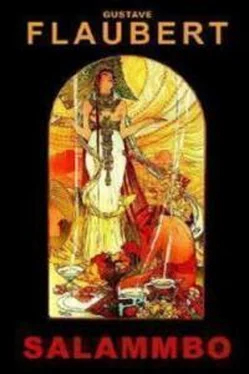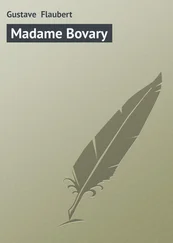Only the beardless priests understood Salammbo; their wrinkled hands, which hung over the strings of their lyres, quivered, and from time to time they would draw forth a mournful chord; for, feebler than old women, they trembled at once with mystic emotion, and with the fear inspired by men. The Barbarians heeded them not, but listened continually to the maiden's song.
None gazed at her like a young Numidian chief, who was placed at the captains' tables among soldiers of his own nation. His girdle so bristled with darts that it formed a swelling in his ample cloak, which was fastened on his temples with a leather lace. The cloth parted asunder as it fell upon his shoulders, and enveloped his countenance in shadow, so that only the fires of his two fixed eyes could be seen. It was by chance that he was at the feast, his father having domiciled him with the Barca family, according to the custom by which kings used to send their children into the households of the great in order to pave the way for alliances; but Narr' Havas had lodged there fox six months without having hitherto seen Salammbo, and now, seated on his heels, with his head brushing the handles of his javelins, he was watching her with dilated nostrils, like a leopard crouching among the bamboos.
On the other side of the tables was a Libyan of colossal stature, and with short black curly hair. He had retained only his military jacket, the brass plates of which were tearing the purple of the couch. A necklace of silver moons was tangled in his hairy breast. His face was stained with splashes of blood; he was leaning on his left elbow with a smile on his large, open mouth.
Salammbo had abandoned the sacred rhythm. With a woman's subtlety she was simultaneously employing all the dialects of the Barbarians in order to appease their anger. To the Greeks she spoke Greek; then she turned to the Ligurians, the Campanians, the Negroes, and listening to her each one found again in her voice the sweetness of his native land. She now, carried away by the memories of Carthage, sang of the ancient battles against Rome; they applauded. She kindled at the gleaming of the naked swords, and cried aloud with outstretched arms. Her lyre fell, she was silent; and, pressing both hands upon her heart, she remained for some minutes with closed eyelids enjoying the agitation of all these men.
Matho, the Libyan, leaned over towards her. Involuntarily she approached him, and impelled by grateful pride, poured him a long stream of wine into a golden cup in order to conciliate the army.
"Drink!" she said.
He took the cup, and was carrying it to his lips when a Gaul, the same that had been hurt by Gisco, struck him on the shoulder, while in a jovial manner he gave utterance to pleasantries in his native tongue. Spendius was not far off, and he volunteered to interpret them.
"Speak!" said Matho.
"The gods protect you; you are going to become rich. When will the nuptials be?"
"What nuptials?"
"Yours! for with us," said the Gaul, "when a woman gives drink to a soldier, it means that she offers him her couch."
He had not finished when Narr' Havas, with a bound, drew a javelin from his girdle, and, leaning his right foot upon the edge of the table, hurled it against Matho.
The javelin whistled among the cups, and piercing the Lybian's arm, pinned it so firmly to the cloth, that the shaft quivered in the air.
Matho quickly plucked it out; but he was weaponless and naked; at last he lifted the over–laden table with both arms, and flung it against Narr' Havas into the very centre of the crowd that rushed between them. The soldiers and Numidians pressed together so closely that they were unable to draw their swords. Matho advanced dealing great blows with his head. When he raised it, Narr' Havas had disappeared. He sought for him with his eyes. Salammbo also was gone.
Then directing his looks to the palace he perceived the red door with the black cross closing far above, and he darted away.
They saw him run between the prows of the galleys, and then reappear along the three staircases until he reached the red door against which he dashed his whole body. Panting, he leaned against the wall to keep himself from falling.
But a man had followed him, and through the darkness, for the lights of the feast were hidden by the corner of the palace, he recognised Spendius.
"Begone!" said he.
The slave without replying began to tear his tunic with his teeth; then kneeling beside Matho he tenderly took his arm, and felt it in the shadow to discover the wound.
By a ray of the moon which was then gliding between the clouds, Spendius perceived a gaping wound in the middle of the arm. He rolled the piece of stuff about it, but the other said irritably, "Leave me! leave me!"
"Oh no!" replied the slave. "You released me from the ergastulum. I am yours! you are my master! command me!"
Matho walked round the terrace brushing against the walls. He strained his ears at every step, glancing down into the silent apartments through the spaces between the gilded reeds. At last he stopped with a look of despair.
"Listen!" said the slave to him. "Oh! do not despise me for my feebleness! I have lived in the palace. I can wind like a viper through the walls. Come! in the Ancestor's Chamber there is an ingot of gold beneath every flagstone; an underground path leads to their tombs."
"Well! what matters it?" said Matho.
Spendius was silent.
They were on the terrace. A huge mass of shadow stretched before them, appearing as if it contained vague accumulations, like the gigantic billows of a black and petrified ocean.
But a luminous bar rose towards the East; far below, on the left, the canals of Megara were beginning to stripe the verdure of the gardens with their windings of white. The conical roofs of the heptagonal temples, the staircases, terraces, and ramparts were being carved by degrees upon the paleness of the dawn; and a girdle of white foam rocked around the Carthaginian peninsula, while the emerald sea appeared as if it were curdled in the freshness of the morning. Then as the rosy sky grew larger, the lofty houses, bending over the sloping soil, reared and massed themselves like a herd of black goats coming down from the mountains. The deserted streets lengthened; the palm–trees that topped the walls here and there were motionless; the brimming cisterns seemed like silver bucklers lost in the courts; the beacon on the promontory of Hermaeum was beginning to grow pale. The horses of Eschmoun, on the very summit of the Acropolis in the cypress wood, feeling that the light was coming, placed their hoofs on the marble parapet, and neighed towards the sun.
It appeared, and Spendius raised his arms with a cry.
Everything stirred in a diffusion of red, for the god, as if he were rending himself, now poured full–rayed upon Carthage the golden rain of his veins. The beaks of the galleys sparkled, the roof of Khamon appeared to be all in flames, while far within the temples, whose doors were opening, glimmerings of light could be seen. Large chariots, arriving from the country, rolled their wheels over the flagstones in the streets. Dromedaries, baggage–laden, came down the ramps. Money–changers raised the pent–houses of their shops at the cross ways, storks took to flight, white sails fluttered. In the wood of Tanith might be heard the tabourines of the sacred courtesans, and the furnaces for baking the clay coffins were beginning to smoke on the Mappalian point.
Spendius leaned over the terrace; his teeth chattered and he repeated:
"Ah! yes—yes—master! I understand why you scorned the pillage of the house just now."
Matho was as if he had just been awaked by the hissing of his voice, and did not seem to understand. Spendius resumed:
"Ah! what riches! and the men who possess them have not even the steel to defend them!"
Читать дальше









![Гюстав Флобер - Закат Карфагена [Сборник]](/books/414440/gyustav-flober-zakat-karfagena-sbornik-thumb.webp)
